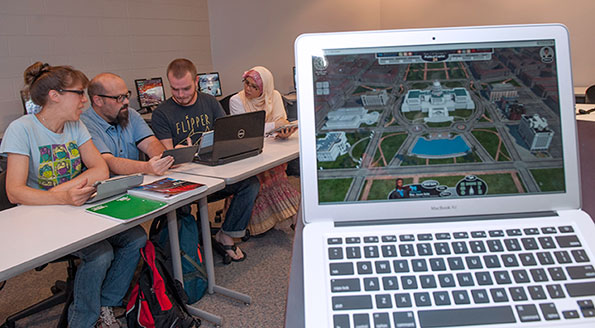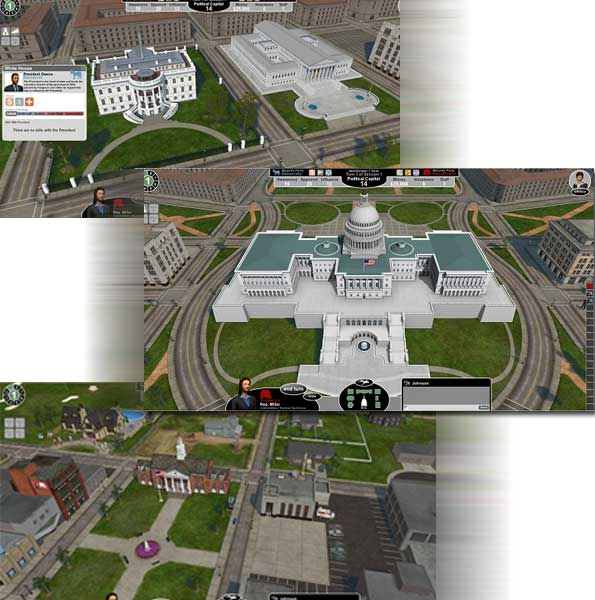
Professor Jason Seitz demonstrates the game to students in his American government class. (Photo by Bill Roa)
Video Game Teaches Intricacies of Congress
by Stell Simonton
Imagine you’re a freshman at Georgia Perimeter College–and you’ve just been elected to the U.S. House of Representatives. You’re short of money, of course. You need staff and volunteers. And you have to worry about re-election.
Sound like a fantasy?
The truth is that all of this can occur in an American government course at GPC. There, each student becomes a virtual member of Congress in the video game “Government in Action”.
Yes–video game.
Although a normal drill for studying might mean putting down the phone, getting off Facebook and stopping the video game, in one GPC class, there’s a twist. The assignment IS the video game.
In GPC professor Jason Seitz’s American government class, “Government in Action” is sometimes played in class, sometimes used as homework.
Each student takes the role of a politician–a member of Congress–and each must gain money, staff and influence to succeed. The goal for the students is to get the most points–and learn something about government. The goal for Seitz? Introduce the intricacies of politics in an effective way.
“It captures the political process very well,” he says.
Seitz has been a tester of the game for publisher McGraw-Hill Education, and he’s pioneering the use of it at Georgia Perimeter.
Skeptics might wonder whether video games–generally considered entertainment and often associated with violent “shoot-em-ups”–are an appropriate teaching tool.
For Seitz, who has been trying to use interactive learning techniques in his class, there’s no question.
“I was looking for something like this,” he says.
With Government in Action, Seitz says he’s been able to shift the learning of basic facts outside class. He assigns students a mission in the game and, in the process of playing, they learn names, dates and definitions. It’s a quick way to get across information, he says, and it frees up class time to discuss and apply concepts.
And as a bonus, “It makes students excited.”
Freshman Josh Seipel didn’t expect to be assigned a video game for homework. “I think it’s cool,” he says.
The most effective aspect is that the game is complex.
“It allows students to understand how all the pieces [of the political process] fit together,” Seitz says.
The 3-D multiplayer game randomly assigns each student a political party and a political district. Often a district has a mixture of Democrats and Republicans or other diverse constituents. Each action a student takes can please some constituents and displease others.
A student makes four moves per turn. Moves can range from introducing legislation, to starting an ad campaign, to throwing a fundraiser to finding political backers. Each choice can add points to the player’s influence in Congress or to their approval rating back home. Each choice has consequences–often unexpected for the beginning student.
Seitz creates questions that can pop up with each move a student makes. The student types in an answer, explaining the move.
The game reminds student Daniel Washington of The Sims, a “life simulation” video game in which players create characters that interact with other characters.
Washington thinks “Government in Action” is a useful teaching tool. “It’s a way to be more interactive,” he says.

The video lets GPC students experience the challenges of serving in Congress. (Art courtesy of McGraw-Hill Education)
Students often start the course with what Seitz describes as unsophisticated ideas. For example, some dismiss all politicians as crooks and liars. But when faced with a decision in the game that might affect some constituents one way and some another way or that might jeopardize a fundraiser or re-election, a student realizes that decisions are not always black and white. Decisions regarding government must take into account many factors.
“Students become more sophisticated as they continue to play,” he says.
Early in the fall semester, not all Seitz’s students were convinced they wanted to play “Government in Action.”
“It’s really great that they’re developing new tools to help people learn,” says Hannah Makarovich, but she prefers the traditional method of listening to the professor and taking notes. The act of writing things down helps her remember them.
Mileidi Salinas, however, thinks students are changing as technology changes. “It’s the only way you can get [some of them] to learn,” she says.
Another advantage of an interactive game, Seitz says, is that students learn through frequent feedback. Gone is the problem of a student passively taking in information–until the big exam arrives and the student is shocked at the result.
Each step along the way, a student’s knowledge is tested.
Rep. John Tierney, a member of Congress from Massachusetts, thinks Government in Action could help interest students in the workings of Congress. Video games with an educational component can be used alongside traditional educational materials, he told CNN. They drive interest because students can interact.
Tierney worked with Massachusetts-based software developer Muzzy Lane, which created the game for McGraw-Hill.
Government in Action is being tested on iPads, and one of Seitz’s classes plays it on those devices. The others play on computers.
The game has two on-screen settings. One illustrates Washington D.C., with the Capitol, congressional offices and other locations. The other shows a player’s home district, including the country club.
To succeed in Congress and gain points in the game, students must get support from other members of Congress, their classmates. “They gain an appreciation for how hard it can be to get a few Congress members together to get work done,” Seitz says.
Learn more about “Government in Action”.







No Comments on “Playing in Politics”